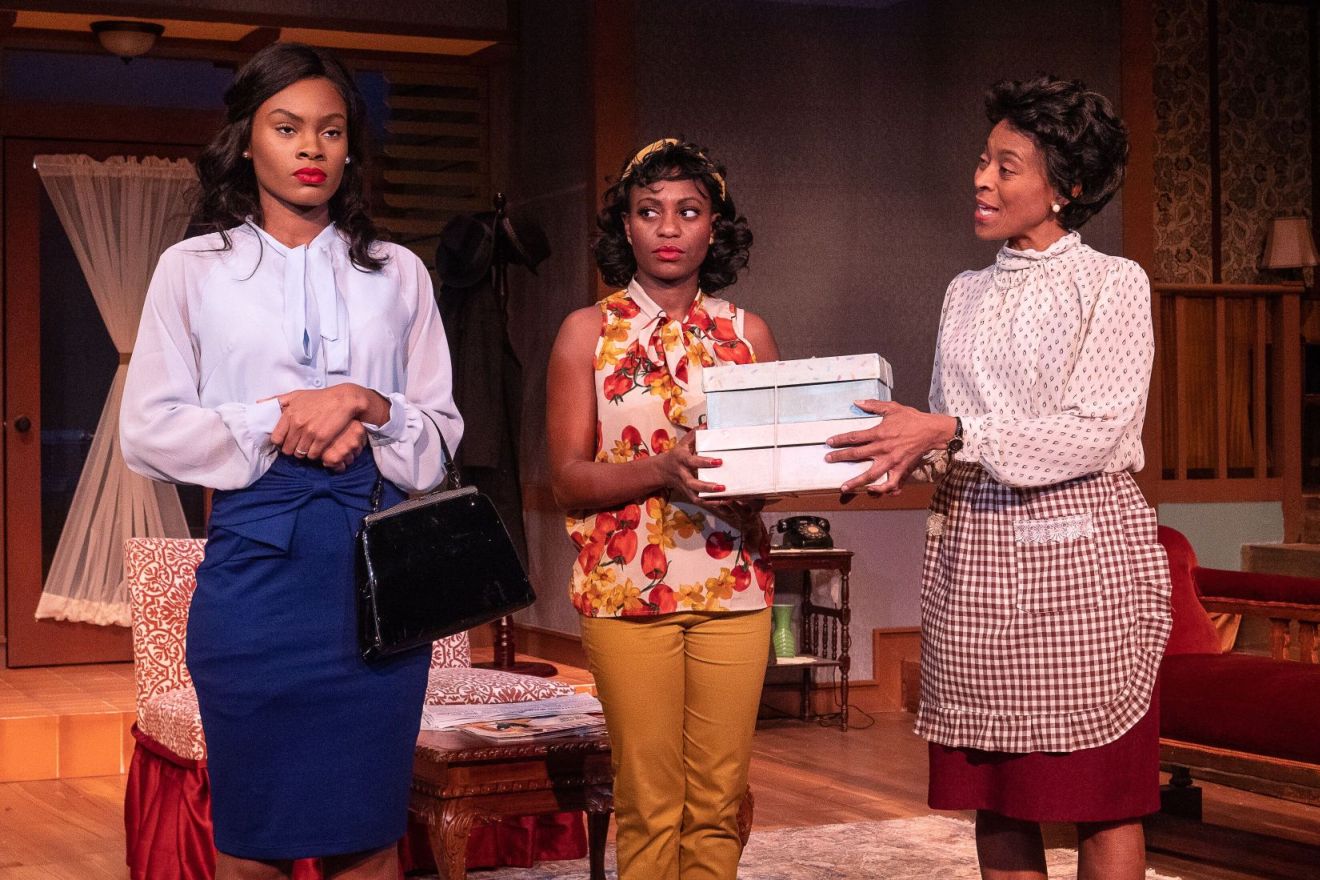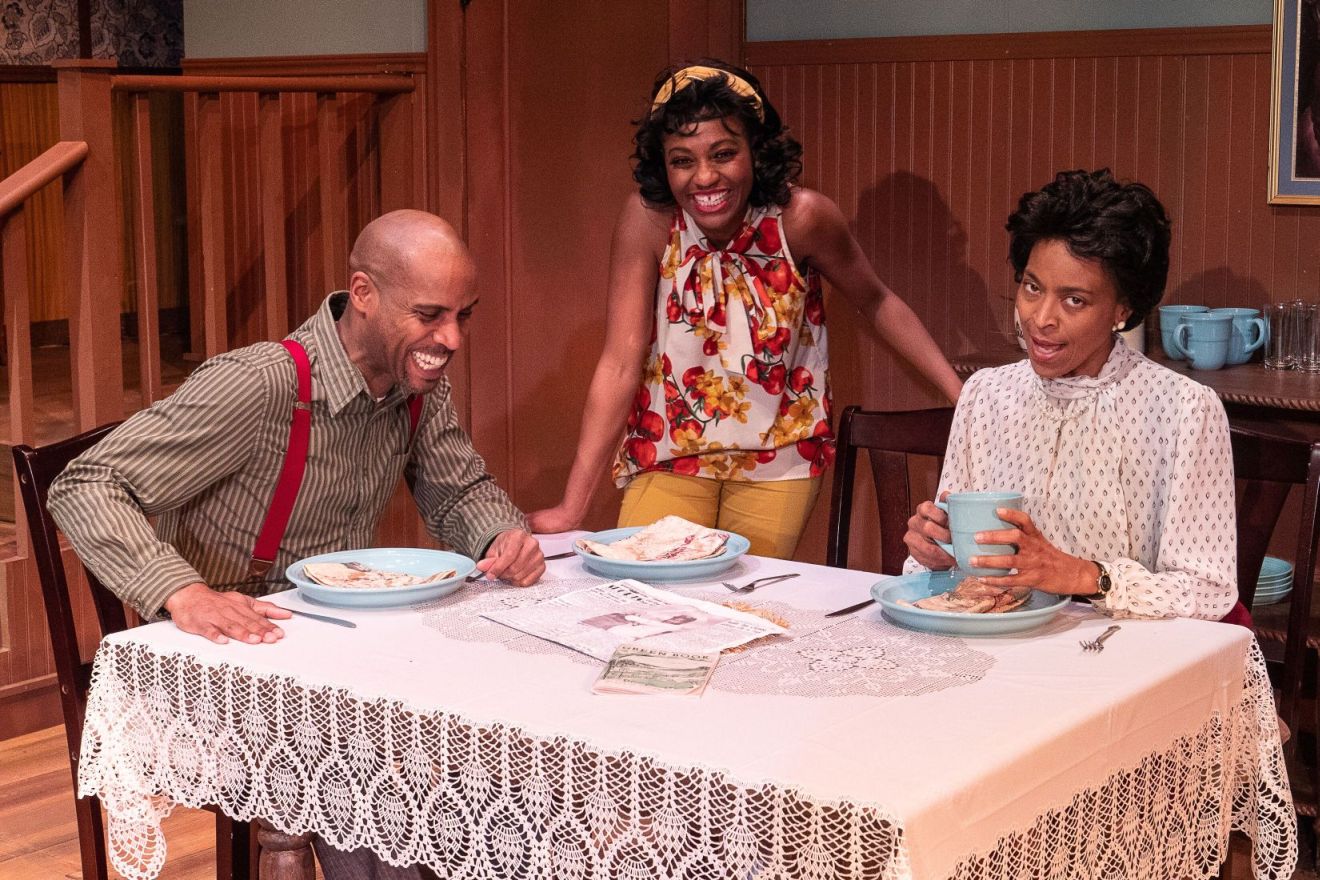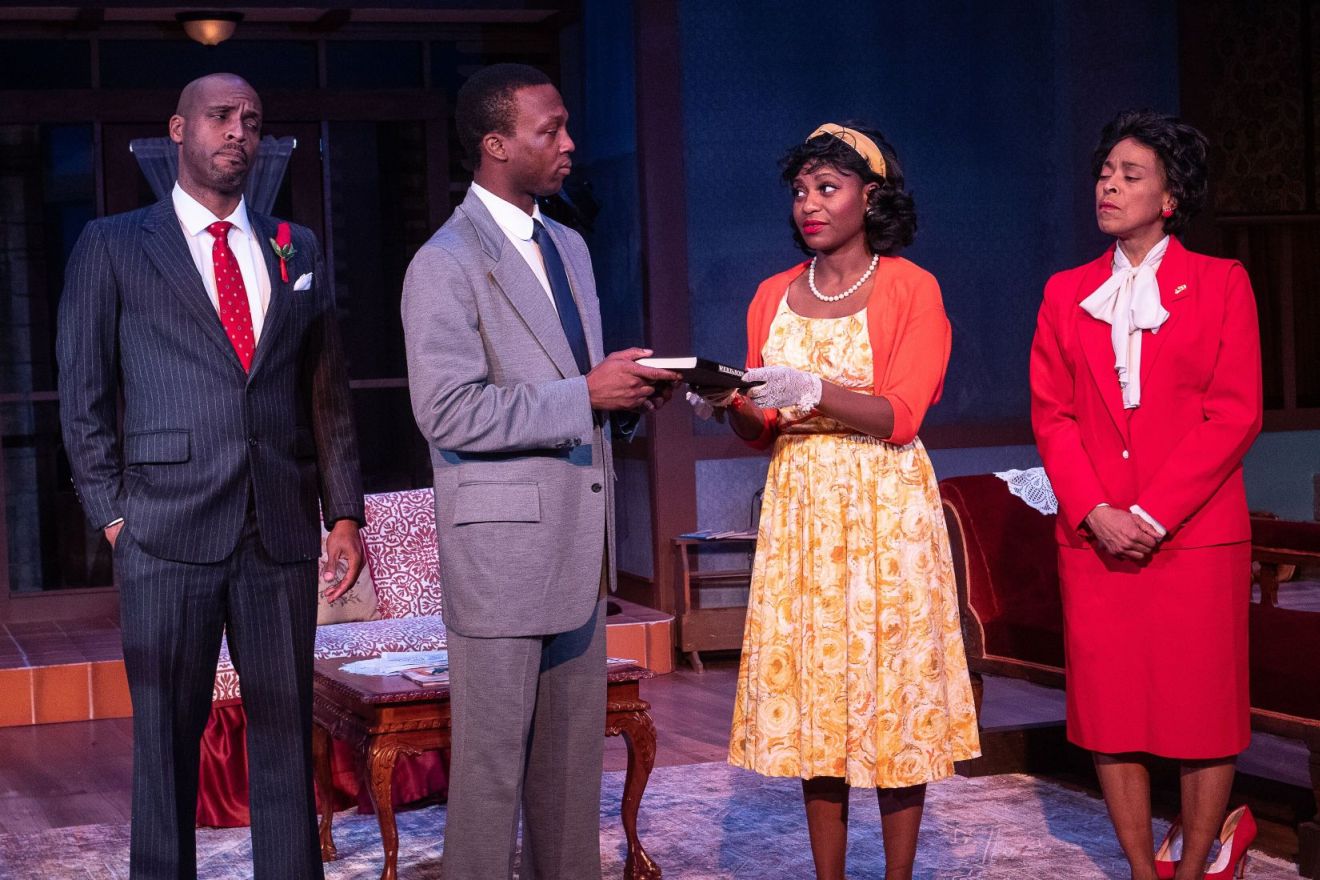THE ENSEMBLE THEATRE
www.ensemblehouston.com

Artistic Director of The Ensemble Theatre EILEEN J. MORRIS
Presents
THE GREEN BOOK
By Calvin Alexander Ramsey
Directed By Shirley Jo Finney
January 23 - February 23, 2020
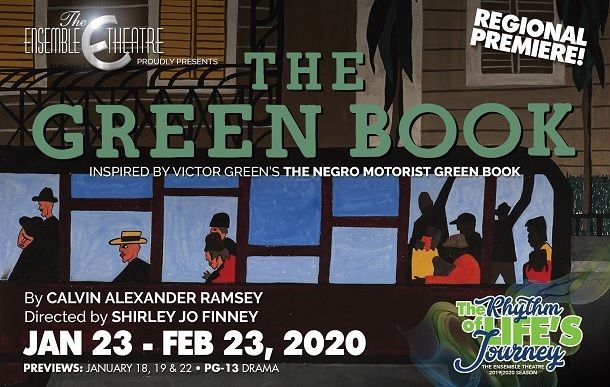
For more information, click on www.EnsembleHouston.com
The Ensemble Theatre Drives into the New Year with “The Green Book”
Inspired by Victor Green’s “The Negro Motorist Green Book”
Who/What:
The Ensemble Theatre drives into the new year with
the regional premiere drama The Green Book, Inspired by Victor
Green’s “The Negro Motorist Green Book” written by Calvin Alexander Ramsey and
directed by Shirley Jo Finney.
Ramsey is an award-winning children’s picture book
author, photographer, and painter. The Green Book is Ramsey’s
first work as a playwright highlighting the difficulties African Americans faced
while traveling in the Jim Crow era. His research in developing this play
recaptures personal narratives elderly African Americans recalling their
emotions and fear of peril while traveling in the South.
The story takes place during a weekend when the Davis’ are celebrating the
arrival of Dr. W. E. B. DuBois for a lecture. The appearance of a white visitor,
who turns out to be a Jewish Holocaust survivor, sets off a chain of events that
shows that racism and anti-Semitism cannot be ignored. This play integrates
historical context of The Negro Motorist Green Book as it investigates the
impact of Civil Rights on contemporary American issues.
Featured cast members include: Timothy Eric (DAN
DAVIS); Rachel Hemphill Dickson (BARBARA DAVIS); Christian Simon
(NEENA MOLLY DAVIS); Kendrick 'Kay B' Brown
(CPT. GEORGE SMITH); Brianna Odo-Boms (JACQUELINE SMITH); Jarred
Tettey (KEITH CHENAULT); and
John Stevens (JACOB LEVINSKY)
Show Run: January 23 – February 23, 2020
Thursdays: 7:30 p.m.
Fridays: 8:00 p.m.
Saturdays: 2:00 p.m. and 8:00 p.m.
Sundays: 3:00 p.m.
Where: The
Ensemble Theatre
3535 Main St, Houston, TX 77002
713-520-0055
Ticket Prices:
$26- $57
Special Pricing:
Group Rates and Weekday Matinees for Schools Available
The Ensemble Theatre's
2019-2020 Season is sponsored in part by grants from the City of Houston through
the Houston Arts Alliance, Texas Commission on the Arts, and the National
Endowment for the Arts. United Airlines is the official airline sponsor for The
Ensemble Theatre. The Green Book is generously supported in part
by ExxonMobil and the Anti-Defamation League.
The Ensemble Theatre was
founded in 1976 by the late George Hawkins to preserve African American artistic
expression and to enlighten, entertain, and enrich a diverse community.
Forty-two years later, the theatre has evolved from a touring company operating
from the trunk of Mr. Hawkins’ car to being one of Houston’s finest historical
cultural institutions.
The Ensemble is one of a few professional theatres in the region dedicated to
the production of works portraying the African American experience. The oldest
and largest professional African American theatre in the Southwest, it holds the
distinction of being one of the nation’s largest African American theatres
owning and operating its facility and producing in-house. Late Board President
Emerita Audrey Lawson led the capital campaign for The Ensemble’s $4.5 million
building renovations that concluded in 1997. The Ensemble Theatre has fulfilled
and surpassed the vision of its founder and continues to expand and create
innovative programs to bring African American theatre to a myriad of audiences.
###

THE GREEN BOOK starring (L-R)
A COMMUNITY COMES TOGETHER
Interview with Calvin Alexander Ramsey
Playwright of THE GREEN BOOK
Theresa@HoustonTheatre.com
January 23, 2020
Born in Baltimore, Maryland and raised in Roxboro,
North Carolina, Calvin Alexander Ramsey is a playwright, author, photographer
and visual artist who now resides in New York.
His first work THE GREEN BOOK, a two-act play about the difficulties
African-Americans faced while traveling during the Jim Crow era, was based on
his research on The Negro Motorist Green Book, a manual directing Blacks to
“safe” restaurants, hotels and gas stations.
The play had its world premiere at Atlanta’s Theatrical Outfit, selling
out many performances. In June 2004,
it won recognition as a finalist in the 12th Annual Last Frontier
Theater Conference held in Valdez, Alaska where it was critiqued by prominent
playwrights, actors and directors including Edward Albee, Tony Kushner, Lloyd
Richards, Courtney Vance and Patricia Neal.
Mr. Ramsey’s other works include the acclaimed
2010 children’s book Ruth and the Green Book and Bricktop the Musical.
Mr. Ramsey is a recipient of the Martin Luther King Jr. Drum Major for
Justice Award. His documentary film,
Green Book Chronicles is in post-production and will feature Houston
Green Book locations.
Theresa: I’ve seen the movie The
Green Book (2018). But I believe
your play was written before the movie came out.
Calvin: about 8 to 9 years ago….
Theresa: Is your play
autobiographical?
Calvin: a little bit.
I always wanted to write.
For a time, I can remember, I started writing poetry.
And then I left writing for a long, long time.
I got married, had children.
I worked in the Insurance business.
I worked in Advertising.
And then after 9/11, I said “I want to give this Writing thing one more
try.” And I was at 51 years of
age when I started, you know?
I was on the Board of Emory University.
I read books and manuscripts.
I started researching different things.
Once I got the historical point of view, I was able to write
creatively on top of that. And
so that’s how it really came to be.
Theresa: isn’t history inspiring
though? I mean, it gets your
creative juices flowing.
Calvin: Yeah, even though I’m
old enough to remember the years of Jim Crow, my family didn’t have a Green
Book. And we traveled but we
didn’t go far, from North Carolina to Baltimore, you can get there in 5 to 6
hours.
But what happened was, I was living in California.
I met the Smith family out there, Jonathan and his sister Patricia
and her husband Tony. And you
fast forward thirty years, I’m at Home Depot to buy a lawn mower for my
youngest son to cut the grass.
And I ran into these people who I met in California thirty years earlier.
A year later, their eldest son was killed in a car accident.
So, I went to the funeral. I was
in the backyard. And the
grandfather came down from New York.
And he said, it’s his first time in the South.
And he was looking for a Green Book.
And that’s how I was introduced to the Green Book.
Theresa: you’ve written your
words on paper. What was it like
hearing your words being performed onstage for the first time?
Calvin: It was surreal.
You know, to hear actors reciting your words and it was almost like
it was an out-of-body experience.
It was like, “Is this really happening?”
Like, the first time I read in the paper I was being called a
playwright.
Theresa: (laughs) it is now official.
Calvin: you know, it hadn’t
really sunk in yet. The first
time I was written up as a playwright.
To see my name, to see me called a playwright.
It was quite wonderful and sort of amazing.
Because I haven’t even called myself that, at that point.
Once I saw it in print, I said, I guess I can call myself a
playwright now. That was really
a humbling experience, and a great experience.
Theresa: do you remember the
newspaper?
Calvin: The Atlanta
Journal-Constitution.
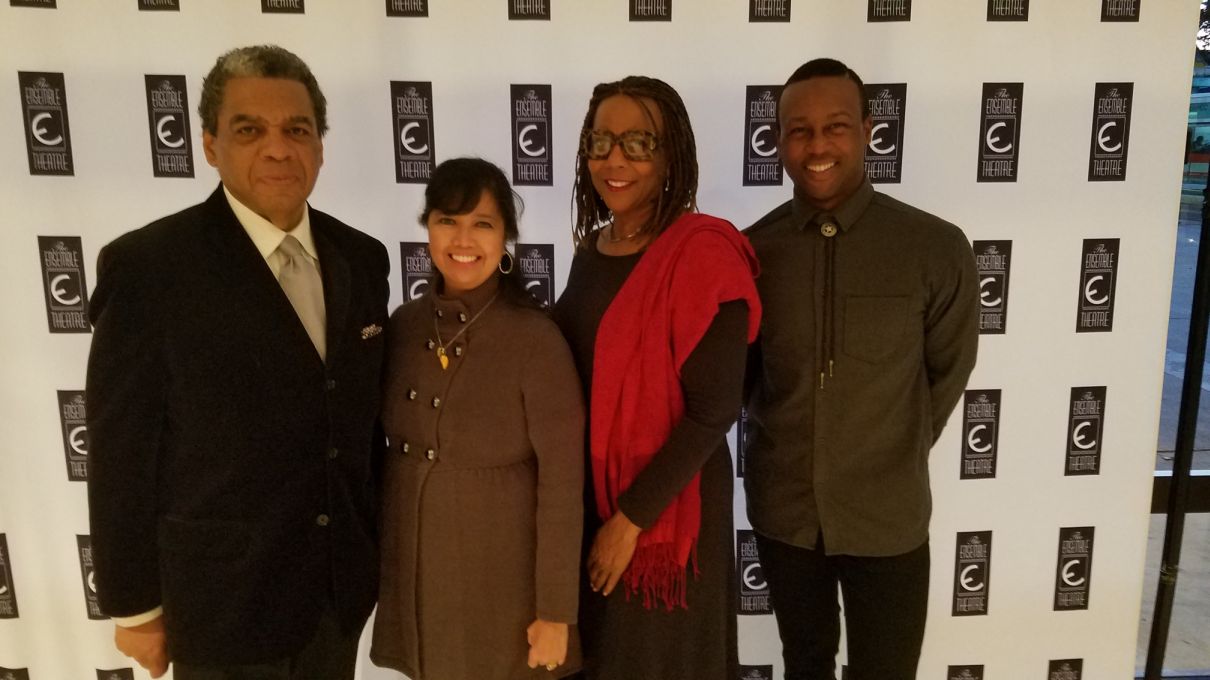
(L-R) Playwright Calvin Alexander
Ramsey, Theresa Pisula, Director Shirley Jo Finney and
Theresa: Where was your play
performed for the first time?
Calvin: The first time I had
a Reading out loud was in New Haven, Connecticut at Yale University.
It was at the Jewish Studies Department, along with the African
studies department. It was
with Dr. King on Yale’s campus, the first time I had a real professional
Reading.
Theresa: How many times has
your play been performed onstage?
Calvin: Full productions:
Atlanta, Birmingham, Chicago, St. Louis.
Theresa: Wow (laughs)!
Calvin: Yeah, it’s been a
miracle (laughs). It’s
absolutely a miracle. You
never know when someone’s going to produce your play, so….
Theresa: that’s because you
are so inspiring….
Calvin: Yeah!
I tell people it’s never too late to follow your dreams.
If I can do it, you can do it.
Because I didn’t know what I was doing!
And I’m still learning.
And the theatre people are wonderful people.
They come to your rescue.
I mean, I’ve seen theatre companies lend some of their costumes,
props, wigs, whatever they might need.
It’s just a beautiful thing.
Theresa: And they’re very
professional, definitely.
Thank you for sharing your experiences.
Calvin: Thank you for doing
this. I remember, writing
the words…
Theresa: that must be
heavenly, to be able to hear your words onstage.
Calvin: Because you’re
writing in the dark. You’re
by yourself. You would never
think this thing would ever be produced anywhere!
Theresa: Really?
You didn’t think anybody was ever going to read it?
Calvin: Right.
Other than you! And
your friends think you’re all crazy.
Theresa: Tell us about your
background….
Calvin: I was born in
Baltimore, grew up in North Carolina.
My father was a Union Steel worker.
His Union went on strike, he moved us to North Carolina to his
home town. My mother is from
Virginia, near where my father grew up.
I went from being a city kid to a country guy, I was 9 years of
age.
So, I grew up on North Carolina, working on a farm, working with
livestock, working in the dirt.
Around good people, a little, small town.
Theresa: Who were your
greatest influence?
Calvin. Both my parents were
great story tellers. They
could both pull an audience.
I think they influenced me first.
And rural Southern people, they told stories to entertain each
other, because they have nothing else.
And Church, that’s pretty much it.
Theresa: What would you like
the audience to gain from watching this play?
Calvin: I want them to see
how a group of people can come together as a community.
Victor Green was a mailman, an African - American mailman who
started in the U. S. Postal Service in 1913, and worked up until 1952.
Him and his wife, they didn’t have children.
So, the Green Book was their baby.
Then, he got other African – American mailmen all over the
country to ask people in their routes, would they mind being in this
book? And that’s how the
book grew.
They were sending addresses to his wife.
And his wife was really the mother of The Green Book because
Victor Green was delivering mail all day long.
But his wife Alma was there in Harlem, putting this book
together. So, I would like
for people to see, especially the young people, to see how the community
was formed. It was almost
like Mr. Rogers neighborhood.
But it was from coast to coast North and South.
Because Jim Crow laws were everywhere, not just in the South.
And how an idea was able to go forward with the help of many
people.
A Jewish printer printed The Green Book.
Standard Oil, which was ESSO (ExxonMobil), they sold The Green
Book at their stations. And
they trained black men to have their own gas stations.
So, when people traveled, they were treated with dignity.
Theresa: What would you like
to say to the Houston theatre – going audience?
Calvin: I would just like to
say, you know, there are Green Book listings in Houston.
I think there are still about 5 or 6 that are still standing.
I was told that the other night.
I would like for them to know a little bit about their own
history here with The Green Book.
Come to the play, I hope they like it.
I hope they find it educational and also entertaining.
You know, I try to do both.
I try to educate and entertain.
This is my first time in Houston.
I’ve been to a lot of theatres, even before I started writing
plays. The Ensemble Theatre
here in Houston is incredible.
It’s a stand-alone building that’s owned by the company.
It’s a beautiful, state-of-the-art building.
I met the cast and the director last night for the first time.
I met Eileen (J. Morris, Artistic Director), so this is the first
time for me to meet everyone.
It’s just been a real incredible experience.
Theresa: Just like Alma
Green writing the addresses down, your words through this play The Green
Book brings everyone together tonight to celebrate history.
The actors and the directors, they live through your words.
Calvin: And they’re all so
talented! They bring new
life to it. New Life!

THE GREEN BOOK starring (L-R)
Interview with Jarred Tettey starring in
The Green Book as Keith Chenault
By Theresa Pisula
January 23, 2020
Jarred “Jet” Tettey is a Houston native making his Ensemble Theatre debut.
Since graduating from Texas State University with a Bachelor of Fine
Arts in Acting, he has appeared in Houston productions with Rec Room (The
Royale), the Alley Theatre (As You Like It, Tender Mercies (Alley All New
Festival), A Christmas Carol), Houston Shakespeare Festival, Main Street
Theatre, Obsidian Theater, Classical Theatre Company, Country Playhouse,
Houston Grand Opera, and in Austin productions with City Theatre Company (A
Raisin in the Sun), and The Baron’s Men (The Tempest).
His television credits include Investigation Discovery’s Swamp
Murders.
Theresa: Tell us about the part
that you’re playing…..
Jarred: I play the character
of Keith Chenault and he is an entrepreneur.
Most recently his job is to sell advertising for the Green Book
for Mr. Green. He is also an
aspiring realtor and owns his own real estate business in New York City
in Harlem. He is an
outsider. In the world we
play takes place in Jefferson City, Missouri.
So, he comes to Jefferson City visiting from New York city, from
Harlem to sell advertising for the Green Book.
And, to stir up all kinds of things (laughs).
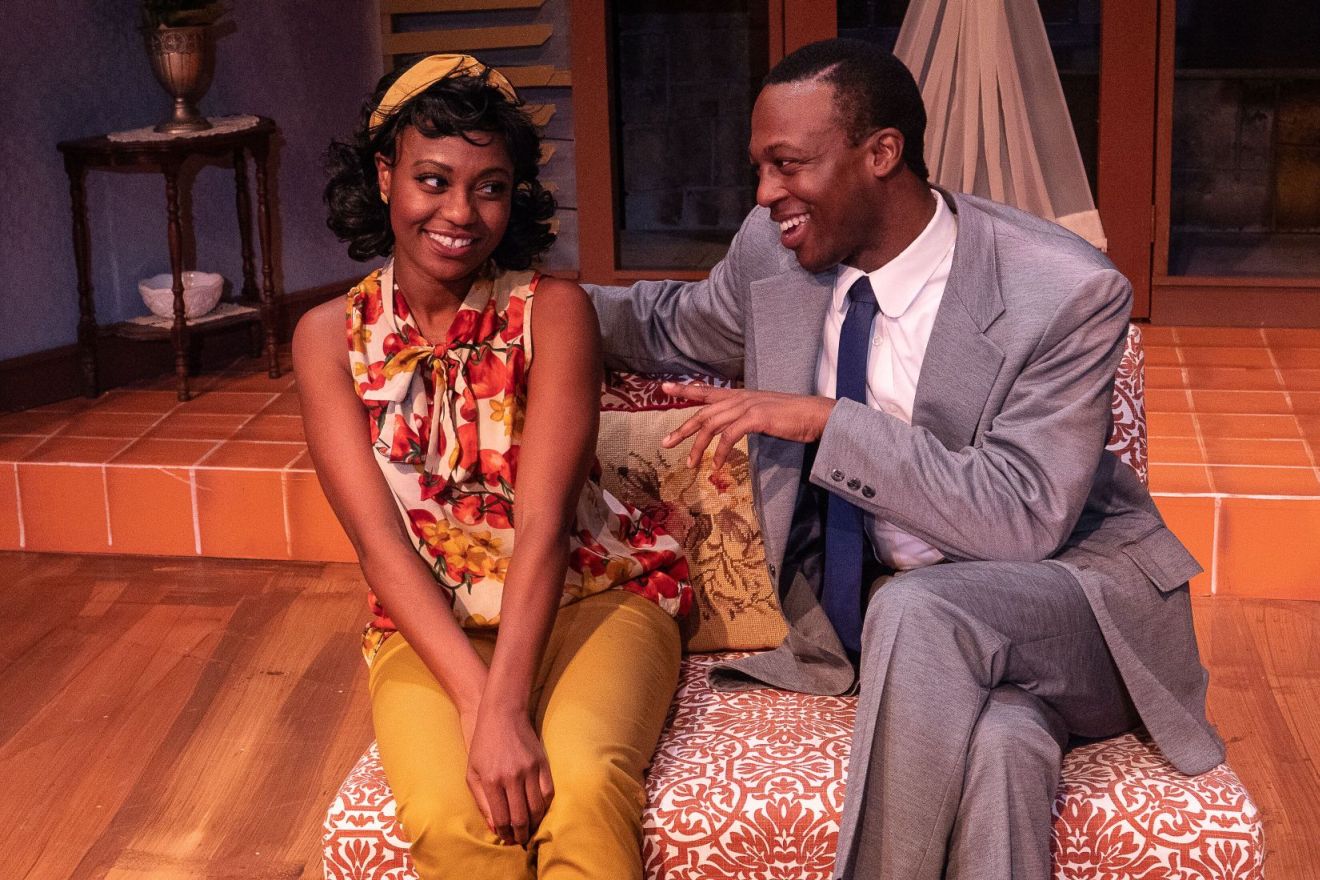
THE GREEN BOOK starring (L-R)
-0-0-0-0-0-
Brief History of Negro Motorist Green Book
The Negro Motorist Green Book was developed by Victor and Alma Green and
published 1936-1967. The Green book was a directory of services for African
Americans traveling during the Jim Crow era that included lodging, restaurants,
medical care, and gas stations. Travelers were able to use the guide to avoid
the dangers of violence in the segregated South. The Green Book was distributed
nationally and was supported by ExxonMobil predecessor Standard Oil through
their chain of Esso retail stations which welcomed African American travelers.
-0-0-0-0-0-
Theresa: now, I’ve seen the movie.
This play is not at all like the movie….
Jarred: not at all.
This play is written by a totally different person, with a completely
different point of view than what the movie explores.
Theresa: did you audition for this
role?
Jarred: Well it was quite
unexpected. I was waiting tables at
my previous restaurant job and Eileen J. Morris (Artistic Director of the
Ensemble Theatre) came to eat at the restaurant.
She had recently seen me in the show I was in called The Royale, which
was at the Rec Room last spring.
Theresa: and she recognized you as a
server in a restaurant?
Jarred: I’ve known Eileen for a
number of years. But our schedules
haven’t aligned. And the stars
haven’t aligned to bring us together….
Theresa: until that night.
Jarred: Until that night.
She had given me the feedback about the show.
And she urged me to come and audition for this season.
Auditions were this past summer and she asked me to audition for The
Green Book.
At first, I was reticent to do it because I was doing A Christmas Carol at the
Alley and my schedules were, you know, I had an overlapping gig.
I didn’t think I could do it.
And she said, “No, no, no.
We’ll work it out, we’ll work it out.”
Theresa: so, she asked you to
audition specifically for this role?
Jarred: I believe so, yeah.
Theresa: that’s amazing.
She has a crystal ball.
Jarred: yeah, she knows exactly what
she wants. That’s one thing I love
about her. That’s my favorite thing
about a director. If I meet a
director who seems to know what they want, I’m all in.
Theresa: (laughs) that’s very specific.
She has you pegged for this role.
Jarred: (laughs) she seemed to know.
She wanted me in this show. It’s
always great when you get that feeling.
I’ve been wanting to work at the Ensemble Theatre for a while.
Theresa: but you still had to
audition?
Jarred: yeah, I auditioned.
I came in and read, I felt good about it.
I felt like, I had a good sense of the character.
Shirley Jo (Finney, the director) gave me some direction.
Eventually, we worked out the schedule, there was a little bit of
overlap. But it worked out pretty
well.
Theresa: where are you from?
Jarred: I was born and grew up here
in Houston (laughs). So, I’m a
hometown boy.
Theresa: what made you want to
become a stage performer?
Jarred: It’s kind of a typical
story. I was a kid who was
overactive, a disruptive class-clown type….
Theresa: (laughs)
Jarred: There was always this sense
of chatter, chatter, chatter.
Performing was within my body, within my spirit.
I didn’t really get into acting until middle school.
I had a middle school teacher Miss Kathleen Kennedy who really encouraged
me to audition for a play, to be a part of Speech and Drama and the Performing
Arts. Miss Kennedy was so
encouraging. When you think about
who brought you into the world, I credit her one hundred percent.
She was the one who was like, “Well channel that into this….”
That carried into high school where in freshman year I auditioned for a play
since I had fun with it in middle school.
It ended up being my extracurricular activity, I was part of the thespian
troupe in high school. Eventually
studied it in college at Texas State, I got my degree in acting.
My first job right out of school is here in Houston, at the Houston Shakespeare
Festival. My acting career sort of
took off from there. I met a lot of
really cool professionals at the Houston Shakespeare Festival like stage
managers, actors, a whole lot of people.
Over the next couple of years, that kind of got the ball rolling.
And the rest, as they say is history.
Theresa: is there anyone else who
influences you as an artist?
Jarred: currently, I follow Billy
Porter. He is somebody who is
unabashedly himself. He has proven
that you don’t have to be anything anyone expects you to be in order to rise to
the occasion. Sometimes, it doesn’t
happen immediately, sometimes it happens 10 years, 20 years or 30 years after
you’ve been doing stuff. There’s no
perfect time line for people. It is
only when it is right for you.
Theresa: What would you like the
audience to gain from watching this play?
Jarred: Especially in today’s world,
there are a lot of different opinions that people have and different ways of
thinking. People come from different
backgrounds and it influences the things they believe and their behaviors.
I would hope that people will learn Tolerance.
Understanding that just because you believe something, that doesn’t mean
that is the only way to believe. And
that is right way to believe. Having
different opinions and listening to different people can help you understand
their point of view. Think about the
other perspective. Think about how
your decisions affect other people.
My character has a strong argument on one particular decision.
But he’s narrow-minded in thinking only the way he believes.
The story I want to tell is allowing other people to influence you,
especially other people you respect and look up to.
Even if they believe something different, listening to them, and letting
that understanding help you make better decisions that you realize will affect
other people.
Theresa: What would you like to say
to the Houston Theatre going audience?
Jarred: There’s so much theatre out
there. You may find yourself loyal
to one theatre, but there’s so many other theatres that are waiting for you to
absorb their content as well. I
encourage everyone who enjoys going to see the theatre to go the extra step and
look at some other theatres that you may not have been to, because chances are,
they’re providing some other type of programming they offer this season.
Theresa: That’s a novel idea.
Open your mind and go beyond your comfort zone to discover new and
exciting ideas.
Jarred: Absolutely!
Especially if people come to midtown and see shows at the Ensemble, MATCH
(Midtown Arts and Theater Center Houston) is right down the street.
There’s so much theatre to see.

THE GREEN BOOK starring (L-R)
